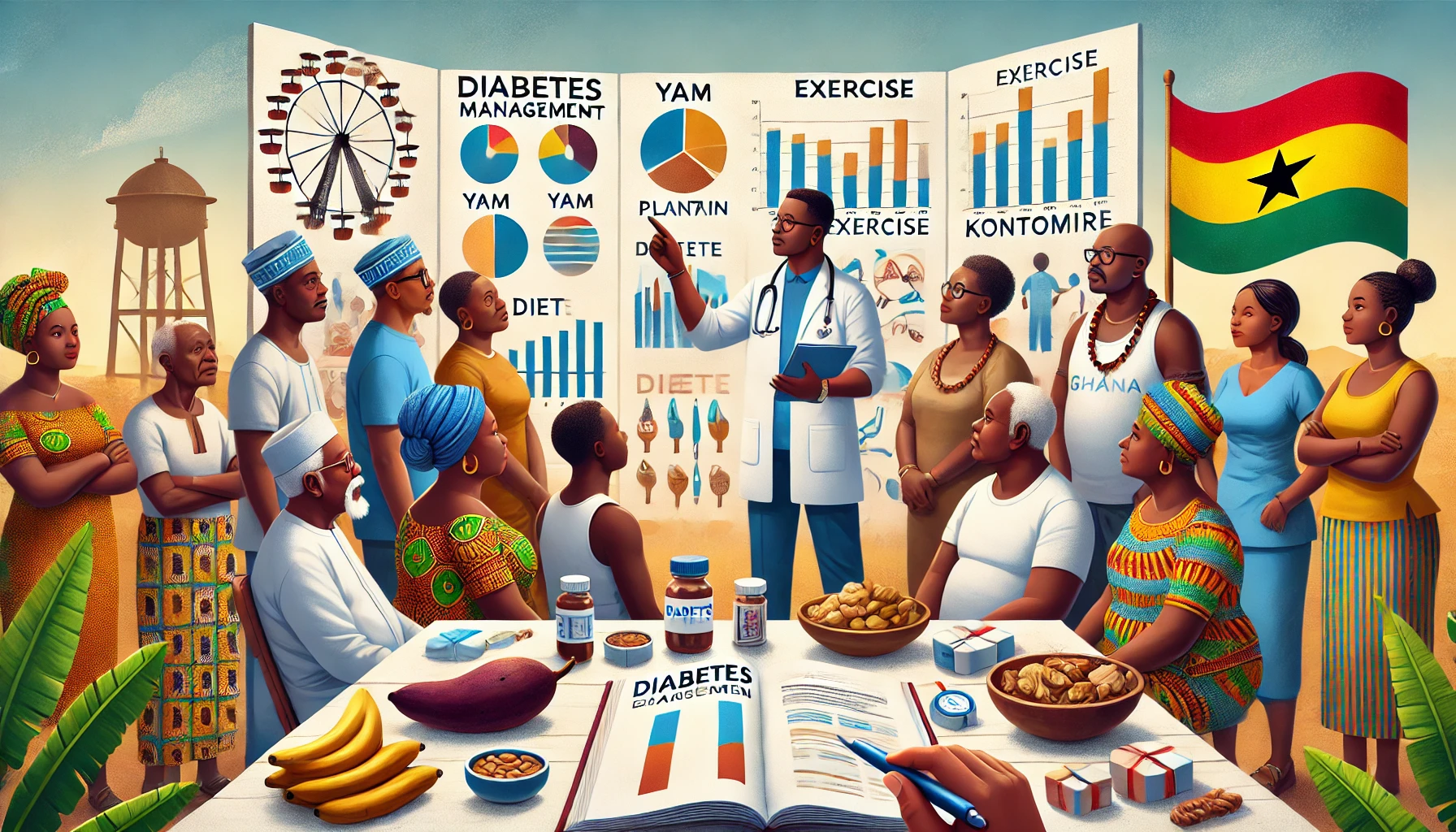
Sweet Lies, Bitter Truths: Ghana’s Diabetes Awakening 🍬📊
Diabetes is becoming more common in Ghana and around the world. Many of our friends, family members, and neighbors may have this condition without knowing. This article will explain diabetes (sometimes called “diabetes mellitus”) in simple language, so you understand what it is, what causes it, how to recognize the signs, and how to manage or prevent it.
1. What Is Diabetes?
Diabetes (also called diabetes mellitus) is a health condition where the amount of sugar in your blood (blood sugar or blood glucose) is too high. Normally, a hormone called insulin helps your body use sugar for energy. In diabetes, your body either does not make enough insulin or cannot use insulin properly, causing sugar to build up in the bloodstream.
There is another condition called diabetes insipidus, which is different from diabetes mellitus. Diabetes insipidus is related to how your kidneys handle fluid (water), whereas diabetes mellitus is about high blood sugar levels. This article focuses mainly on diabetes mellitus.
Images are only illustrative; may not pass an academic critique
2. Types of Diabetes
There are several types of diabetes, each with different causes and treatments. The main types are:
2.1 Type 1 Diabetes
- Often called juvenile diabetes (though adults can develop it too).
- The body does not produce insulin at all.
- People with Type 1 diabetes need insulin injections every day.
2.2 Type 2 Diabetes
- The most common form in Ghana and worldwide.
- The body does not produce enough insulin or cannot use insulin well.
- Strongly linked with lifestyle factors such as diet, obesity/overweight, and lack of exercise.
- Often managed with oral diabetes drugs (like metformin) and/or insulin.
2.3 Gestational Diabetes
- Develops in some women during pregnancy (also called diabetes in pregnancy).
- Usually disappears after the baby is born, but can increase the mother’s risk of developing Type 2 diabetes later.
2.4 LADA Diabetes (Latent Autoimmune Diabetes in Adults)
- A slower form of Type 1 diabetes that happens in adults.
- Similar to Type 1 but can be mistaken for Type 2 at the beginning.
Sometimes, you might hear about prediabetes, which is when your blood sugar is higher than normal but not high enough to be called diabetes. Moving from prediabetes to diabetes can happen if you don’t make lifestyle changes.
Images are only illustrative; may not pass an academic critique
3. Causes of Diabetes (Why Does It Happen?)
3.1 Causes of Diabetes Mellitus
- Genetics (family history): If your parents or siblings have diabetes, your chances are higher.
- Being overweight or obese: Excess body fat makes it harder to use insulin properly.
- Unhealthy diet: Eating too many sugary or fatty foods can lead to weight gain and insulin resistance.
- Physical inactivity: Not exercising reduces the effectiveness of insulin in your body.
- Age: The risk increases with age, though diabetes can affect anyone, including young people.
3.2 What Food Causes Diabetes?
No single food causes diabetes on its own. However, regularly consuming foods high in sugar, refined carbohydrates (like pastries, sweet drinks), and saturated or trans fats can increase your risk, especially if you do not exercise.
4. Risk Factors for Diabetes
Diabetes risk factors include:
- Family history of diabetes
- Being overweight or obese
- Sedentary lifestyle (not being active)
- Unhealthy diet
- High blood pressure
- High cholesterol
- History of gestational diabetes (if you had diabetes during pregnancy)
5. Signs and Symptoms of Diabetes
Warning signs of diabetes or symptoms of diabetes include:
- Frequent urination (especially at night)
- Excessive thirst
- Feeling very hungry
- Unexplained weight loss (common in Type 1)
- Fatigue (tiredness)
- Blurred vision
- Slow-healing sores or wounds
- Numbness or tingling in hands or feet
For women, certain issues such as frequent vaginal infections can be an early sign of diabetes. For men, erectile dysfunction can sometimes be associated with diabetes.
Images are only illustrative; may not pass an academic critique
6. Diabetes Normal Level and Level Chart
A normal blood sugar level is generally:
- Fasting blood sugar (before eating): 70–99 mg/dL (3.9–5.5 mmol/L)
- Two hours after a meal: less than 140 mg/dL (less than 7.8 mmol/L)
A doctor uses a diabetes level chart (including tests such as the fasting glucose test, random glucose test, and HbA1c test) to determine if you have normal blood sugar, prediabetes, or diabetes.
7. Complications of Diabetes
When diabetes is not well controlled, it can lead to serious health problems:
- Diabetes retinopathy: Eye damage that can cause blindness.
- Diabetes nephropathy: Kidney damage that can lead to kidney failure.
- Diabetes neuropathy: Nerve damage causing pain, tingling, or numbness.
- Diabetes foot ulcer or sores on feet: Poor circulation and nerve damage can make wounds heal slowly, leading to infections.
- Diabetes coma: A life-threatening state of unconsciousness due to extremely high or low blood sugar.
- Diabetes ketoacidosis (DKA): A serious problem for people with Type 1 or sometimes Type 2, where the body produces harmful acids (ketones) due to lack of insulin.
- Hyperglycemic Hyperosmolar State (HHS): A severe increase in blood sugar (more often in Type 2) that can lead to coma or death.
Images are only illustrative; may not pass an academic critique
8. Can Diabetes Be Cured?
You may have heard claims like “diabetes can be cured” or that certain supplements or drugs like “Vikil 20” can cure diabetes. As of now, there is no permanent cure for most cases of diabetes. However, it can be managed and, for some people with Type 2, blood sugar can be returned to normal levels through significant lifestyle changes. Always consult a qualified health professional before trying any new medication or supplement.
9. How to Prevent Diabetes (Prevention of Diabetes)
How can we prevent diabetes? Here are some tips:
- Eat a balanced diet: Incorporate plenty of fruits, vegetables, whole grains, and lean proteins.
- Watch portion sizes: Overeating can lead to weight gain.
- Stay active: Aim for at least 30 minutes of moderate exercise (like brisk walking) most days of the week.
- Maintain a healthy weight: Excess body weight increases your risk.
- Limit sugary drinks and snacks: Too much sugar can worsen insulin resistance.
- Avoid smoking and limit alcohol: Smoking and excessive alcohol intake can increase your risk of complications.
10. Management of Diabetes Mellitus (Treatment and Control)
10.1 Medications for Diabetes
- Insulin injections: Essential for Type 1 diabetes; sometimes used in Type 2.
- Oral diabetes drugs: Like metformin, sulfonylureas, and others for Type 2 diabetes.
- Diabetes supplements: Some people use supplements (e.g., vitamins, minerals) to support overall health, but these do not replace prescribed medications.
Always work with a health professional to figure out the best diabetes type 2 treatments or treatments for Type 1 diabetes.
10.2 Diabetes Diet (What to Eat and What to Avoid)
- Best food for diabetes control: Vegetables (kontomire, okra), whole grains (brown rice, whole-wheat kenkey), beans, lean protein (chicken without skin, fish), and fruits with low sugar content.
- Fruits good for diabetes: Watermelon (in moderation), oranges, pawpaw, apples, pineapples (in smaller quantities).
- Is banana good for diabetes? In moderate amounts, bananas can be part of a healthy diet because they contain fiber and essential nutrients.
- Is yam good for diabetes? Yam, especially boiled yam (without added oil), can be eaten in moderation. It is high in carbohydrates, so watch your portion size.
10.3 Lifestyle Changes
- Physical Activity: Engage in regular exercise (walking, jogging, dancing).
- Weight Management: Losing even a few kilograms can improve insulin sensitivity.
- Regular Check-ups: Monitor blood sugar regularly and attend follow-up appointments.
10.4 Diabetes Patient Food (Local Ghanaian Perspective)
- Focus on high-fiber Ghanaian staples like boiled plantain, kokonte, or banku made with whole grains.
- Limit heavy oils, fried foods, and sugary drinks (sobolo with added sugar, soft drinks).
- Replace sugary snacks with fresh fruit.
- Try grilling, baking, or steaming foods instead of frying.
Images are only illustrative; may not pass an academic critique
11. Diabetes in Pregnancy (Gestational Diabetes)
Gestational diabetes occurs when a woman’s blood sugar becomes high during pregnancy. This can affect the health of both mother and baby. Even though diabetes in pregnancy often goes away after childbirth, it raises the risk of developing Type 2 diabetes later. Pregnant women should:
- Have regular prenatal check-ups.
- Follow a healthy diet recommended by a healthcare provider.
- Monitor blood sugar levels carefully.
- Stay active with safe exercises, like walking.
12. Diabetes and Foot Care
If you have diabetes, you may have nerve damage (neuropathy) and poor circulation in your feet. This can lead to diabetes sores on feet, infections, or diabetes foot ulcer. To prevent serious problems:
- Check your feet daily for cuts or blisters.
- Wear comfortable shoes that fit properly.
- Wash your feet with mild soap and water, then dry gently.
- Seek medical help if you notice any wounds that do not heal quickly.
13. Frequently Asked Questions
13.1 Will diabetes be cured? / Can diabetes be cured?
- Currently, there is no permanent cure for most forms of diabetes. However, good management can keep blood sugar levels near normal, allowing you to live a healthy life.
13.2 Difference between Type 1 and Type 2 Diabetes
- Type 1: The body makes little or no insulin, often starts in childhood or young adulthood, requires insulin injections.
- Type 2: The body makes some insulin but cannot use it well, often linked to lifestyle factors, more common in adults (but also in youths).
13.3 Difference between Diabetes Mellitus and Insipidus
- Diabetes Mellitus: High blood sugar (the main focus of this article).
- Diabetes Insipidus: A rare condition related to fluid balance, not blood sugar.
13.4 What is Gestational Diabetes?
- High blood sugar during pregnancy; usually resolves after delivery, but raises future Type 2 diabetes risk.
13.5 What Causes Low Blood Sugar Without Diabetes?
- This can happen due to poor nutrition, skipping meals, or certain medications. If you experience symptoms like shakiness, confusion, or sweating, consult a health professional.
13.6 Can Diabetes Be Transmitted Sexually?
- No. Diabetes is not an infection and cannot be spread through sexual contact.
14. Key Takeaways for Ghanaians
- Early detection is crucial. If you notice any early signs of diabetes such as frequent urination or extreme thirst, visit a clinic for a check-up.
- Simple lifestyle changes matter. Eating balanced meals (including local Ghanaian foods prepared in healthier ways), exercising regularly, and controlling your weight can go a long way in prevention of diabetes.
- Regular monitoring and management. If you already have diabetes, follow your healthcare provider’s instructions on drugs for diabetes, diet, and lifestyle to prevent long-term complications.
- Seek professional advice. Avoid self-medication or believing in “miracle cures.” Always consult a doctor or pharmacist.
Conclusion
Diabetes may be on the rise in Ghana, but understanding it and taking steps to prevent and manage it can protect you and your loved ones. Whether you have Type 1, Type 2, or gestational diabetes, remember that proper care, a balanced diet, regular exercise, and sticking to your prescribed medications can help you live a healthy, active life. There may not be a complete cure yet, but with the right knowledge and support, diabetes can be well-controlled—allowing you to thrive in all areas of your life.
- High Blood Pressure: How Much is Too High? - What Every Ghanaian Should Know 🏃♂️💖🩺
- Kidney Health 101 for Ghanaians 🌱🍏🥕🥬
- From Waakye to Wellness 🍽️💪: Fixing Ghana’s Malnutrition Puzzle
- Popular Ghanaian Dishes: Ingredients, Nutrients, Health Benefits, and Myths 🥘🍲🍚
- Building Immunity: Your Path To a Disease-Free Future 💪

We Love to Educate for Free
But please do not self-medicate as wrong doses of even correct medications can cause serious complications like kidney failure and even death. You can talk to a LICENSED health professional (including medical doctors, specialists, physician assistants, clinical psychologists, nutritionists/dieticians, medical herbalists, etc) by downloading the Deluxe Hospital app here:










